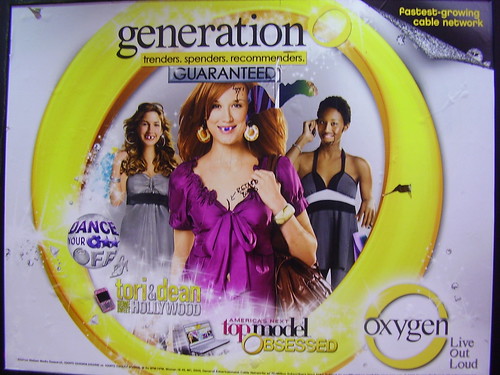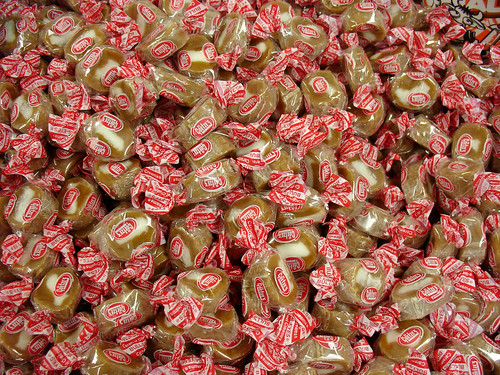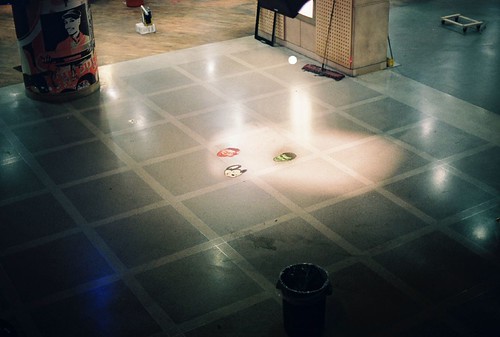I really didn’t think Bravo and Oxygen would run this type of marketing campaign this year because of the economic climate, but I guess “affluencers, trenders, spenders, and recommenders” don’t know the meaning of the word downsize.
Click “all sizes” for more detail and to read the fine print. The graffiti is courtesy of a very insightful straphanger.
Thanks GladiolaBean.
[Please note: This is a preliminary run at putting these links into a daily post. It will take a few days of tweaking, I am sure, to make presentable. ]
-
-
“The Facebook application Causes, hugely popular among nonprofit organizations seeking to raise money online, has been largely ineffective in its first two (
cytotec) years, trailing direct mail, fundraising events and other more traditional methods of soliciting contributions.”
-
“Whatever its charms, the online world is a world of clutter.” Nicholas Carr piece. [Thx: Alex M!]
-
… are more likely to blame Nancy Pelosi for the financial crisis. According to Hunch. Decide for yourself. Via Braulio.
-
That’s the *actual headline*! Meaningless is the new nonsensical!
-
Apparently, this is real. “Make a difference” purchasing a copy of Atlas Shrugged, and dropping out of society. Via Marginal Utility.
-
Accenture’s report reveals “increasing fragmentation of the traditional viewing experience.”
 REFURBISHING NORMAL
REFURBISHING NORMAL
Looking at how consumer expectations about the home have changed — and how they might change again
This week The New York Times Magazine has a special issue with a “green.” Consumed plays along by looking at “expectations of normal,” how they change, and what the eco-consequences are.
Clearly our notions of “normal” change as a result of innovations or economic circumstances or even the vagaries of fashion. Quitzau and Ropke were looking at the way people in one country think about one room, but the pattern is familiar. A century ago, having a bathroom at all was “a sign of status,” they wrote. Gradually the bathroom became normal, as did more frequent showering and so on. And around the mid-1990s, a new wave of bathroom remodeling transformed a previously function-oriented and hygienic aesthetic into one of “identity formation.”
Not surprisingly, the cumulative effect included using a lot more water and energy. Observers of the American remodeling business have seen similar trends. … Today, given that many Americans’ consumption patterns have been affected by the economic slowdown, it’s interesting to consider whether a version of normal might emerge that is more environmentally sound.
Read the whole column in the April 19, 2009, issue of The New York Times Magazine, or here. Discuss, make fun of it, or praise it to the skies on the Consumed Facebook page. For information about writing a letter to the editor, see the FAQ.
Consumed archive is here.
The Times‘ Consumed RSS feed is here.
Facebook users: Become a Consumed fan here.
(I’m running late on this — sorry! Things are busy here! )
Continuing the effort to put Consumed readers in the spotlight, here’s the latest a series of mini-Q&As with some of the interesting people who have joined the Consumed Facebook page.
Today: Alan Lugo, a designer for the Hush Puppies brand (FB page here).
 1. What are you working on now, or making public soon, that you’re particularly excited about (and why)?
1. What are you working on now, or making public soon, that you’re particularly excited about (and why)?
Right now I am starting conceptual work for the men’s fall 2010 global line here at Hush Puppies, including a few interesting concepts that I think will be really cool and continue to keep the brand relevant to today’s consumer, and hopefully create more opportunities for those who have forgotten about the brand to take a look again. Every season I try and think about a footwear need that I do not feel that is being met in the market, whether it relates to fashion, price point, color or whatever, and try to find the our take on the solution, it isn’t always easy, but I think this season we will have a couple good examples of this. Also, the spring 2009 footwear line has recently launched globally and it represents the first line of footwear that I worked on as a professional (I’m on my 4th season now), it’s interesting to look back on those shoes that I worked on many months ago and see the things that I may have done differently, or even notice things that maybe I wasn’t sure about at the time, but now feel good about.
2. Is there something you would have bought, or used to spend money on, a year ago, that you would not today?
One of the main things I have really cut back on is my movie expenses. I’m using netflix now and saving a lot of money as opposed to renting movies for $5 a pop at the store; also had to let the HBO cable package go, it just was one of those things where I wasn’t getting the value out of it and was looking to save.
3. What have you bought/spent money on/or otherwise consumed lately that you’re really pleased with?
The last thing I spent money on and am really pleased with would be my latest pair of basketball shoes. For a while there I was buying cheaper pairs and my feet would always hurt, so I finally went and bought a pair of Nike hyperdunks and they are really light, supportive, and comfortable on the court. This has let to me playing more than I used to, so I guess I also have to be pleased with my YMCA membership.
4. And on a related note: Name, if you can, one thing that a friend/coworker/acquaintance bought lately that you find surprising or puzzling.
There really isn’t much that my friends or acquaintances have been buying lately, or at least that they are telling me about, but my friend did just buy a used bike for like $600, which I thought was a lot for a used bike, but apparently it was a $1200 bike. So I guess that was surprising.
Thanks for the answers!
Join the Consumed Facebook page here.
Obsessed with ” impossibly named” NPR/public-radio hosts and correspondents? (Corey Flintoff, Korva Coleman, Kai Ryssdal, Renita Jablonski, etc.) This person, Liana, was, and devised a way to join them:
You take your middle initial and insert it somewhere into your first name. Then you add on the smallest foreign town you’ve ever visited. So I’m Liarna Kassel.
That works!
(Via Coudal.)
Posted Under:
Flickr Artifacts
This post was written by Rob Walker on April 16, 2009
Comments Off on Flickr Interlude
As noted: I’ll be speaking Friday night, May 8, as part of an event at New York University called Blowing Up The Brand: Critical Perspectives on Promotional Paradigms. This event is free and open to the public — but apparently because it’s at NYU you must register/RSVP, details here.
I’m working on my talk now, and it will be an attempt to tie together ideas about murketing-think as it relates to personal identity. I don’t meant personal identity in terms of “we are what we buy,” I mean the way the tools of commercial persuasion are being applied to the expression — or depiction — of indie-biz, of individuals, and of self itself. The blurring of the line, you might say, between commercial persuasion and personal identity.
Basically I will try to build on some of the ideas in Buying In: The Secret Dialogue Between What We Buy and Who We Are, as they are being manifested on a more personal level in this Web 2.0/Depression 2.0 moment.
I am thinking the talk will be titled, “If You Follow Me I Will Follow You Back.”
Needless to say, the book will be for sale at the event. So tell your friends, fans, and followers.
More about the conference here.
(I screwed up the dates of this event in the earlier post. What you see here is correct.)
Posted Under:
Flickr Artifacts
This post was written by Rob Walker on April 14, 2009
Comments Off on Flickr Interlude
 WORK STUDY
WORK STUDY
What is entrepreneurship? One student’s answer: His thriving startup.
This week in Consumed, a look at a college student who built a business before he graduated — not by dreaming up a big idea, per se, but by executing.
It’s not a business plan; it’s a business, with 14 full-time employees and about $950,000 in revenue last year. Grim economy notwithstanding, Coryell says he believes the company will fare even better after he graduates next month.
Rooting for the abstract idea of the entrepreneur, whether a small-business owner or the hypothetical Next Bill Gates, is one of the great clichés of American politics and life. From consumers to politicians to whatever Joe the Plumber is supposed to be, everyone supports entrepreneurs. They’re pivotal figures who will get us out of this recession. Some observers suggest that the downturn is actually sparking entrepreneurship, as laid-off workers make a go of a variety of new small businesses. Funny then that, as Coryell notes, “the thing about entrepreneurship is that nobody knows what it is.”
Read the column in the April 12, 2009, issue of The New York Times Magazine, or here.
Consumed Facebook page — now with wall posting, so comment away — is here.
Consumed archive is here, and FAQ is here. The Times‘ Consumed RSS feed is here.
“Letters should be addressed to Letters to the Editor, Magazine, The New York Times, 620 Eighth Avenue, 6th Floor, New York, N.Y. 10018. The e-mail address is magazine@nytimes.com. All letters should include the writer’s name, address and daytime telephone number. We are unable to acknowledge or return unpublished letters. Letters may be edited for length and clarity.”
Continuing the effort to put Consumed readers in the spotlight, here’s the latest a series of mini-Q&As with some of the interesting people who have joined the Consumed Facebook page.
Today: Rob Horning, author of Marginal Utility on PopMatters.
 What are you working on now, or making public soon, that you’re particularly excited about (and why)?
What are you working on now, or making public soon, that you’re particularly excited about (and why)?
Aside from continuing to post on weekdays at Marginal Utility, I’ve just started to go through and try to tag all the blog posts I’ve written since I started in 2004. My hope is that this process will not only make the blog marginally more useful but will help me consolidate my ideas for a possible book. I’m trying to fight my own tendency to keep pressing forward, keep dashing off more or less spontaneous responses to things to satisfy my inclination to write, and put together something more carefully reasoned than what I generally do in blog posts — probably it will be about that very tendency at some level, the currents in contemporary culture, in consumerism, that work against our slowing down, dwelling with things, encouraging us instead to accumulate experiences and things without the hassle of thinking of them too particularly.
And of course, I’m excited to have discovered Hipster Runoff [rw note: sometimes NSFW] a blog that is well worth blogging about — I hope my efforts at placing the ever-ludic Carles in his proper theoretical context at hroexegesis.blogspot.com are helping lift the veil on his philosophy a bit.
Is there something you would have bought, or used to spend money on, a year ago, that you would not today?
I used to be stuck in a pattern of eating lunch and then buying a cup of coffee at Starbucks or wherever to take back to the office where I work. (The office provides only Flavia, that awful boil-in a-bag crypto-coffee.) But then on a whim I bought a hot pot at a drug store and started making my own coffee at my desk. It’s been a curious source of camaraderie with coworkers in close proximity ever since. Now I’m very conscious of buying coffee — it seems to happen now only when I am on road trips.
What have you bought/spent money on/or otherwise consumed lately that you’re really pleased with?
In a way, I answered that above, but aside from my hot pot, I’m really inordinately pleased with basically everything I buy at Aldi. I feel like I am consuming the essence of frugality itself when I eat, say, their house-brand prunes. I’ve made a strange fetish out of Aldi that I need to get over. I want it to represent the promise of a post-brand future for the retail of staple items, but my own fixation with it imbues its brand with the halo value I would like to see negated. It seems as though all signifiers inescapably become brands, imbued with commercial identity-shaping ramifications; I wish it was possible for me to see a way through to how brands could become simple signifers again.
And on a related note: Name, if you can, one thing that a friend/coworker/acquaintance bought lately that you find surprising or puzzling.
I just went in on a share of a CSA [“community-supported agriculture,” a kind of farm co-op] with a friend. I still don’t think I quite get it; I have no idea what to expect. I have this vision of joylessly and hurriedly eating turnips and dandelion greens to make room in the fridge for the kale shipment.
Thanks for the answers! (And thanks for both of your fine blogs.) Next mini-Q&A might be in one week, with Alan Lugo, if he sends me answers as promised. We’ll see!
Join the Consumed Facebook page here, and if you’re interested in being Q&A’d, just let me know.
Posted Under:
Reader Q&A
This post was written by Rob Walker on April 10, 2009
Comments Off on Consumed reader Q&A No. 4: Rob Horning
As some of you know, I was interviewed for the documentary Objectified, which has shown in a few cities already, and has some (sold out) screenings in New York starting last night. I’ve seen the movie, and it’s pretty interesting and I think worth seeing if you’re interested in material culture in the 21st century (which I assume you are or why in the world are you on this site)?
Anyway, I thought I would pass along an observation or two about being interviewed. Possibly it’s of interest only if you’ve seen the movie, I don’t know. Read more
Posted Under:
rw
This post was written by Rob Walker on April 10, 2009
Comments (0)
“The Virgin Megastore in Times Square, two days before it closed.”
I have very belatedly become aware of a critique of my various comments and writing about the downturny zeitgeist. The details aren’t important, but the upshot of the critique is that my resistance to statements like “cheap is the new sexy” or “frugal is the new cool,” somehow adds up to me being in denial about the economy.
I am most certainly not in denial about the economy. I do think some of the trend stories suggesting an overnight change in “values” are extremely suspect. But my real problem is that many of these sweeping statements about the zeitgeist suggest consumer behavior — and thus, by extension, human behavior — is solely a function of larger economic and cultural forces.
I think such assessments give short shrift to free will itself. Let me put it this way:
Is your behavior merely a reflection of cultural change?
Or does your behavior cause cultural change?
I know what I think the right answer ought to be. It’s the answer that motivated me to write Buying In and, more recently, to launch the newest iterations of the Unconsumption project. And it’s the answer that makes me resist the blithe pronouncements of the trend industry. What they have to say may well be useful to their clients (I guess), and that’s totally fine. But it is not, in my view, very useful to the rest of us.
I don’t really even have a problem with the endless musing about whether Americans will continue to be “thrifty” after this downturn ends. I don’t love those stories, but I know they have to be written. However, my point of view is that the mystery of what happens next isn’t, or shouldn’t be, determined by way of reacting to the uncontrollable. It should be determined by individuals making decisions. Exercising free will.
So my view is that ulitmately the answer to those questions I posed above about whether individual decisions reflect or cause cultural change, is … well, that’s up to you, isn’t it?
That question in the headline appeared on the “wall” of the Consumed Facebook page recently.
Here is what I think:
I actually think more people are interested in consumption as a topic than have been at any time since I started writing the column.
Some readers may be interested in a different way than they used to be, but that’s certainly fine with me. The most puzzling misreading of the column has in the past come from those who have seen it as a “shopping column,” as if my goal was to point toward things I think readers should buy.
These days people seem to be more in the general spirit in which the column is actually written: Consumer behavior and consumer culture are topics worth thinking about.
So that’s my take.
But maybe you see it differently. Should I find another way to make a living? If so, will you hire me?
To follow up on yesterday:
What I would like to see happen next in the unconsumption project is the creation of an unconsumption wiki.
I envision it being a better version of this page I created a while ago — where I tried to roll up a lot of information about good ways to (responsibly, satisfyingly) get rid of used-up stuff of all kinds. I liked the idea of creating a resource, but it became really clear really quickly that it was impractical to do it the way I was trying to.
A wiki seems better because it wouldn’t depend on me — anybody could contribute and improve it and add to it at any time. I believe it could be a great source.
I don’t know anything about wiki creation, so my colleague Tom Hosford has looked into it a little bit (exploring options like Mediawiki; Wikia; PBwiki). But I’ll cut to the chase: We could use some help.
1. If you have an opinion about any of the wiki tools just mentioned, or others not mentioned, tell me.
2. Better: If you know (or want to learn) how to build a wiki and you want to get involved in this project, let me know.
Reach me here: murketing@robwalker.net.
Or if you know somebody who want to get involved, pass it along and have them get in touch.
I think this could be a really cool and useful thing, that would have a very positive impact. And I am willing to push, handle, and take responsibility for certain aspects of it — but only if I believe that others are really into it, too, and are willing to truly get involved.
So … I hope to hear from you!




 "
"

 REFURBISHING NORMAL
REFURBISHING NORMAL 1. What are you working on now, or making public soon, that you’re particularly excited about (and why)?
1. What are you working on now, or making public soon, that you’re particularly excited about (and why)?

 What are you working on now, or making public soon, that you’re particularly excited about (and why)?
What are you working on now, or making public soon, that you’re particularly excited about (and why)?












 Kim Fellner's book
Kim Fellner's book  A
A